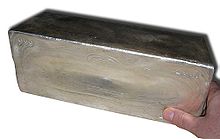| Revision as of 14:32, 15 December 2011 edit188.113.80.60 (talk) →Silver bars← Previous edit | Revision as of 14:53, 15 December 2011 edit undoAnomieBOT (talk | contribs)Bots6,559,101 editsm Dating maintenance tags: {{Fact}}Next edit → | ||
| Line 22: | Line 22: | ||
| === Silver bars === | === Silver bars === | ||
| * Fineness: minimum of 999.0 parts per thousand silver | * Fineness: minimum of 999.0 parts per thousand silver | ||
| * Marks: serial number, refiner's hallmark, fineness, year of manufacture, weight{{fact}} (optional) | * Marks: serial number, refiner's hallmark, fineness, year of manufacture, weight{{fact|date=December 2011}} (optional) | ||
| * Silver content: 750 oz t - 1100 oz t (900 oz t - 1050 oz t recommended) | * Silver content: 750 oz t - 1100 oz t (900 oz t - 1050 oz t recommended) | ||
| * Recommended dimensions | * Recommended dimensions | ||
Revision as of 14:53, 15 December 2011


The Good Delivery specification is a set of rules issued by the London Bullion Market Association (LBMA) describing the physical characteristics of gold and silver bars used in settlement in the wholesale London bullion market. It also puts forth requirements for listing on the LBMA Good Delivery List of approved refineries.
Good Delivery bars are notable for their large size and high purity. They are the type normally used in the major international markets (Hong Kong, London, New York, Sydney, Tokyo, and Zurich) and in the gold reserves of governments, central banks, and the IMF.
The Good Delivery Rules for Gold and Silver Bars
The entire Good Delivery specification is contained in the LBMA document titled The Good Delivery Rules for Gold and Silver Bars: Specifications for Good Delivery Bars and Application Procedures for Listing. The document includes specific requirements regarding the fineness, weight, dimensions, appearance, marks, and production of gold and silver bars. It specifies procedures for weighing, packing, and delivery. It also describes policies for ensuring refiners' compliance with the specifications.
The current edition of the Good Delivery Rules was published in June 2011.
Basic specifications
Gold bars
- Fineness: minimum of 995.0 parts per thousand fine gold
- Marks: serial number, refiner's hallmark, fineness, year of manufacture
- Gold content: 350 oz t - 430 oz t
- Recommended dimensions
- Length (top): 210 – 290 mm
- Width (top): 55 – 85 mm
- Height: 25 – 45 mm
Silver bars
- Fineness: minimum of 999.0 parts per thousand silver
- Marks: serial number, refiner's hallmark, fineness, year of manufacture, weight (optional)
- Silver content: 750 oz t - 1100 oz t (900 oz t - 1050 oz t recommended)
- Recommended dimensions
- Length (top): 250 – 350 mm
- Width (top): 110 – 150 mm
- Height: 60 – 100 mm
Non-Good Delivery
Bars that do not comply with Good Delivery rules are termed Non-Good Delivery. If they are similar to Good Delivery bars but do not fully meet the requirements, they must be stamped with "NGD" to distinguish them from conforming bars.
LBMA Good Delivery List
The LBMA maintains two Good Delivery Lists of approved refineries (one for gold and one for silver) that meet certain minimum criteria (age, net worth, and production volume) and have demonstrated their ability to produce Good Delivery bars. Listed companies agree to submit to monitoring by the LBMA. Those listed companies that refuse to participate in regular monitoring are removed from the Good Delivery List and added to the Former List.
The LBMA claims copyright over the Good Delivery List.
See also
- Gold as an investment
- Silver as an investment
- Gold reserve
- Gold bar
- Doré bar
- Gold standard
- Silver standard
- Refining (metallurgy)
External links
- The Good Delivery Rules for Gold and Silver Bars
- Specifications for Good Delivery Bars
- Non-GD Bars
- LBMA Good Delivery List (gold)
- LBMA Good Delivery List (silver)